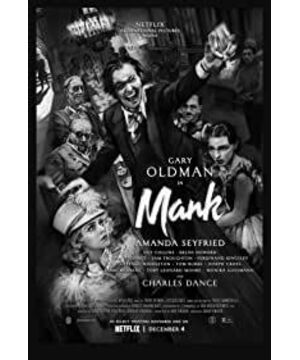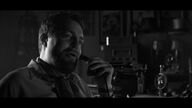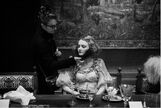"Mank" tells the story behind the creation of the script for the classic movie "Citizen Kane". Compared to director David Fincher's other suspenseful films, this black-and-white period film, which mixes studio struggles with real-world politics, is a fairly high-ticket film. To understand this film, you not only need to see "Citizen Kane", but also need to understand the situation of Hollywood in the 1930s and 1940s, and even the whole world.
"Mank" is the nickname given to protagonist Herman J. Mankiewicz. He was commissioned by director Orson Welles to write a script that defied convention in sixty days. Through the eyes of this cynical alcoholic, gambler, and social critic, we get a glimpse into the materialistic Hollywood of the 1930s.
1. The development of the first Hollywood movie
The 1930s and 1940s were Hollywood's "best times" and America's "worst times." The aftermath of Black Friday is still affecting the U.S. economy, workers' protests are emerging one after another, and the shadow of the Nazis is spreading across the European continent, but Hollywood's bigwigs are still striving for their own power and wealth. In order to attract people into the theater, RKO recruited Orson Welles and asked him to write, direct and act in a Hollywood "big news". But Wells, who was filming "Heart of Darkness," was out of control, so he entrusted the script writing to Mank. The alcoholic and gambler, Mank, is struggling with debt and can only accept Wells's request to write the script within 60 days and give up his authorship. He ends up in his hospital bed as his former close friend, the newspaper tycoon William Landau. Alf Hirst completed the screenplay for Citizen Kane as the prototype.
The story of "Citizen Kane" begins. Newspaper tycoon Charles Foster Kane dies alone in his castle, Xiandu, with no relatives besides nurses and servants. Before his death, he left a last word" Rosebud". So, a reporter Thomson was ordered to investigate, trying to find the answer to this riddle. During the conversation with the five characters Kane got along with, Kane's legendary life unfolded slowly in front of the audience.
Kane's life experience may seem bizarre, but it is a one-to-one replica of his original character, William Hirst.
The Hearsts, prospered by gold and silver mining, were lavish, cynical, and expelled from Harvard for mocking the professor. He didn't care about this and began to devote himself to the newspaper industry, starting from a local newspaper, spending huge sums of money to poach Pulitzer's footing, and establish his own newspaper kingdom. The most exaggerated act of poaching was in 1896, when Hearst's "San Francisco Examiner" rented next to the Pulitzer's "World" office and lured all the "World" staff to change jobs with high salary. This resulted in a spectacle that the day before, the "World News" was full of talented people, and the next day, they collectively went to work in Hearst's "New York Daily". Since then, the two giants of the newspaper industry have forged a beam, and the wave of "yellow news" has swept the entire United States.
The "yellow news" here does not refer to news with color, but refers to news content that catches people's attention by using inflammatory headlines, fabricating false content, flaunting sympathy for the underprivileged, and inciting social movements. "Yellow" is named after the protagonist of the comic strip "Yellow Child". He wears yellow clothes and walks around the streets of New York. He likes to tell some sensational news, which is very popular with ordinary readers. It was first serialized in Pulitzer's "The World" newspaper". However, due to Hirst's "dead son and no grandson" digging, the "yellow boy" was also taken captive to his "New York News". Therefore, Pulitzer and Hirst launched a battle over the custody of the "yellow child", competing to concoct fake news, draw "yellow child" cartoons, and even create a war for it.
The United States and Spain, which were in the expansion stage at the time, had constant frictions. By propagating the atrocities of the Spaniards and fabricating the news of Spanish warships shelling American warships, Hearst succeeded in making the American people full of hatred for Spain, forcing US President McKinley to send Spain officially declared war. In 1898, when the Spanish-American War broke out, the sales of Hearst's "Morning News" soared, and Pulitzer was helplessly involved in the wave of advocating this "unjust war".
Too much fake news has also made Hearst notorious, and he has been unsuccessful in several political elections, and has been called "the most hated man in America".
Political frustration, love affair. Kane's love affair with singer Susan was based on Hearst's extramarital affair with actress Marion Davis. Hearst did not formally divorce his wife, like Kane, because his wife was a Catholic. Just as Kane pressed Susan to become an opera singer, Hearst pressed Marion to play inappropriate roles.
In fact, the most similar point between Kane and Hirst is undoubtedly the profound Narcissus plot. They never care about material money and money, but only focus on the pursuit of spiritual dreams, and the people around them are just pawns for their self-satisfaction. Because he prides himself on being a voice for the bottom people, Kane doesn't care about the objections of his wife, Emily, the president's niece. In order to show his affection, he would rather lose the election and maintain his affair with Susan.
Never really considering others, Kane ended up alone and died alone in the gorgeous castle.
What exactly is a rosebud? Fame, fame and fortune are nothing but a cloud. This is the core idea of Citizen Kane and the life experience of screenwriter Manke. He thought he was watching from the sidelines and saw through the hypocrisy of the upper class, but in the eyes of others, he was also a clown who wore a crown and danced gracefully.
The turning point in Kane's life was the defeat of the election, and Hearst's turning point was the Spanish-American War he single-handedly forged. After the war, his newspaper sales plummeted. In 1901, U.S. President McKinley was assassinated. The murderer carried Hearst Newspaper's malicious reports on the president. The strong public opinion forced Hearst to correct his wrongdoing. Coupled with the blow of the American economic crisis, Hearst was on the verge of bankruptcy for a time. .
Although his nemesis, Pulitzer, was also involved in the "yellow news" controversy, he eventually repented and devoted himself to serious news reporting, established the Pulitzer Prize for Journalism, and became a forefather admired by the press.
Today, the Hearst Group is still standing. Hearst Castle, as the most luxurious castle in California, is full of tourists, but Hearst himself can only be used as the prototype of "Citizen Kane", which makes people sigh.
2. Golden Hollywood under the Great Depression
Great works are often inseparable from the waves of the times behind them that are radically changing. "Mank" is a movie that makes a footnote for the times.
In the 1920s, with the end of World War I, the birth of countless new inventions, and an unprecedented wave of industrialization, the United States ushered in the "Roaring Twenties" of sustained economic prosperity. Then-President Hoover even vowed that "the ghetto era will disappear from America". However, it all ended in 1929.
With the sudden collapse of the U.S. stock market on October 29, the U.S. and even the world entered a depression that lasted for more than a decade. Factories closed in large numbers, leaving unemployed workers and poor people hungry. Agricultural capitalists and large farmers destroyed the "surplus" product in large quantities. The Hollywood tycoon burst into tears on the podium, but offstage was complacent about his outstanding performance.
The Great Depression of the 1930s sparked a collective rebellion against capitalism and modernity. An important story line in the film is the eventual defeat of Sinclair, a socialist who advocates for the rights of ordinary workers in Hollywood.
The film faithfully recalls the 1934 California gubernatorial election that determined the fate of Hollywood. Sinclair is a well-known left-wing writer in the United States. Sinclair takes eliminating poverty and the gap between the rich and the poor as his political platform, and regards the exploitation of Hollywood workers by film studios as a key issue, calling for the re-employment of film jobs laid off during the financial crisis. By.
But Hollywood studio tycoons were unanimously opposed to Sinclair. They put pressure on employees and opened a Pandora's box - making a false propaganda film attacking Sinclair - to start a history of media meddling in politics. It has since become commonplace in U.S. elections, and the way to control the media and create fake news to attack opponents in political campaigns starts here.
At first Manke didn't think fake videos could do anything, and even joked that no one would believe them when his friend Shelley was troubled by making fake videos. It was only after he finally learned that Sinclair had lost the election that he painfully discovered that he was unwittingly helping the tyrants. He reluctantly quoted Goebbels, the head of the Nazi propaganda department, as a mockery: "As long as you continue to lie loudly to the public, they will believe it."
Today's 21st-century Hearsts have far more technological power than traditional media tycoons, manipulating what you think by controlling what you see. With the help of algorithms, this has become a reality.
Of course, you don't have to be too pessimistic. Modern journalism research has found that news propaganda is difficult to change people's attitudes, and at best affects the wavering centrists. Just as no matter how the left-wing media "smears" Trump, in the eyes of fans, he is still the true hero of that Make America Great Again.
In addition to the changes in the political propaganda war, the handover of power in Hollywood is also the main line of the era of "Mank".
History books say that the worst 1930s for the American economy was also the golden age of Hollywood. People walked into the cinema and watched one movie after another, trying to temporarily forget the pain of the Great Depression in real life in the fake world created by Hollywood.
At this time, the technology of the film industry transitioned from silent to sound, Wall Street capital deeply intervened in Hollywood, and producers controlled the final editing rights, forming a "producer-centered system". Films began to be stylized, cast and crew were starred, and production methods were formulated. Movies became a large-scale standardized commodity, and Hollywood stars were no longer dazzling.
Here we must mention the "King of Hollywood" of the big studio era - Louis Mayer.
During the Great Depression, almost all Hollywood studios were hit hard. Only MGM, under Meyer's management, even managed to make a small profit. Between 1930 and 1933, 9 of the 24 highest-grossing films were produced by MGM, and they also produced masterpieces such as "Gone with the Wind" that were both artistic and commercial, making them the uncrowned king of Hollywood.
During this process, the factory assembly line was brought into Hollywood, the functions of director and screenwriter were decomposed and cut, and the status of screenwriters plummeted. In fact, in the era of silent films, screenwriting is not a serious profession at all, and most of the directors are part-timers. The script can be exchanged and changed at will. After entering the era of sound films, the importance of the screenwriter's role has only increased.
3. History repeats itself and the golden cage
Whether it is Hearst, who is the prototype of the character, or Kane, the protagonist in "Citizen Kane", it is the rich second generation who started the business empire with one hand, and then moved to the political arena, all the way to the overbearing president.
Maybe it was intentional, maybe it was a joke of history. "Mank" hits theaters on November 13, 2020, on the same day that the Georgia governor officially declared Biden the victory, dashing Trump's re-election hopes. And Trump once mentioned in an interview that his favorite movie is "Citizen Kane".
Citizen Kane has a Faustian story to its core. In order to pursue unlimited knowledge and power, Faust traded with the devil, selling his soul in exchange for twenty-four years of glory and power. There is something of Kane in Trump, in terms of wealth, politics or marriage. No wonder Trump and Kane have a sense of sympathy. He once sighed: "Wealth may not be the most important thing, because Kane has wealth but is not happy. The dining table is getting bigger and bigger, but the distance between him and his wife is getting bigger and bigger. The farther away, and at the same time he's getting richer. Maybe I can feel his mood."
When asked by reporters what Trump would say if he could give Kaine advice, he bluntly said "change the woman."
Maybe he didn't understand "Citizen Kane", or maybe, after the hustle and bustle, when he sat at Mar-a-Lago, he would also think of the rosebuds in his heart.
What makes Citizen Kane's screenplay great is that the symbolism of "rosebud" is universal. Kane pursued fame and fortune all his life to achieve greatness. When death came, he forgot everything he was chasing, and found that what he really wanted to pursue was nothing but the absence of his childhood.
At the end of the film, Hirst tells Mank a meaningful story. A monkey dressed up by street performers is chained to a gilded chain. The monkey thought that because of his dancing, the people around him cheered, and the street performers would not starve to death. But the truth is: he has to perform, whether he wants to or not.
Manke spent his whole life in Hollywood's upper-class celebrity circle, hoping that his talent would be recognized. In the end, I found that in the eyes of the capital boss, I was just a monkey performing with a gold necklace. However, although Hirst thinks Mank is a monkey, he is on the verge of bankruptcy a few years later, and he has also become a monkey of his own destiny. In fact, isn't each of us unaware that we are chasing after something and toiling around?
Whether it is "Citizen Kane" or "Mank", which tells the story of its birth, both emphasize the disenchantment of the temptation of the outside world and the reflection on the consciousness of narcissism. Kane pretends to be a petitioner for the people, but he is actually boasting.
At the end of the "Mank" movie, Mank said this sentence: "I seem to be more and more like a mouse, trapped in a cage made by myself, as long as the cage seems to have the slightest opening for me to escape. , I'll fix it from time to time."
Perhaps, the rosebud in Kane's mouth, Nianzi's original intention, is the key to unlocking the shackles. It's ironic that Manke, an alcoholic and gambler, is the most sober person in the crowd, isn't it?
[B station/video account/zhihu search "Brain Flying Mindflix" to understand the wonderful reality behind the screen]
View more about Mank reviews











